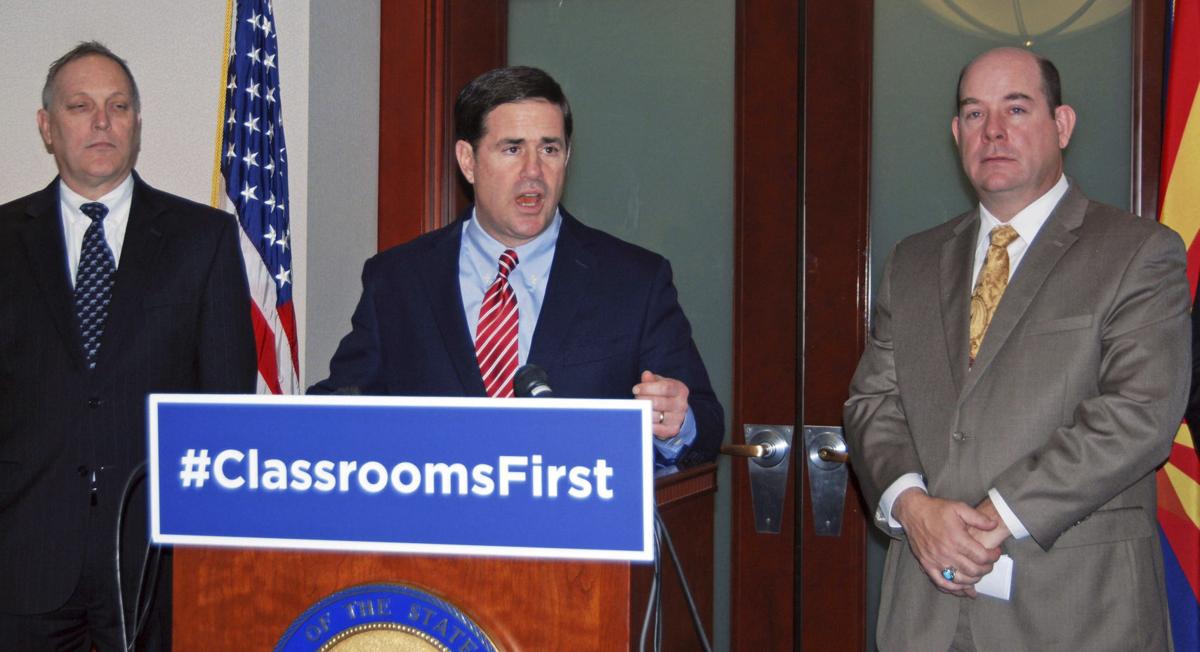Pima County sued the state Monday, claiming its new budget illegally forces millions of dollars in education spending onto county taxpayers.
The county’s request for special action in Arizona Supreme Court asks justices to undo the shift of more than $45 million in costs back to counties in Gov. Doug Ducey’s budget plan approved by the Legislature in March.
By law, the combined primary property taxes assessed throughout each county are capped at 1 percent of a home’s cash value. Since 1980, the state has provided extra funding to counties like Pima for the amount that tax rates go above the cap.
Under the new budget, however, the state would now pay no more than $1 million per county in additional state aid for education and instead would force local governments to cover the costs.
That could cost Pima County taxpayers an extra $18 million and force the county to transfer nearly $9 million of that to Tucson Unified School District, county officials estimate.
Pima County’s primary property tax rate is $4.27 and TUSD’s primary rate is $6.80. Together, the two primary rates exceed the cap at a total of $11.07.
“It seems to me that we’re at a point where we need to be open and honest about how we’re being treated by the Legislature and governor,” County Board of Supervisor Richard Elías said, adding he thinks state actions have been arbitrary and unfair.
Supervisor Sharon Bronson agreed, saying education funding is the responsibility of state government, not the county.
“It’s punishing us for a crime we didn’t commit,” Bronson said.
The county makes two main legal arguments in its request for special action.
The first argument contends the state violated separation of powers clauses established in the Arizona Constitution because the Legislature essentially delegated taxing authority to the state’s Property Tax Oversight Commission.
Commission members are appointed by the speaker of the House, Senate president and governor, and they are tasked with ensuring fair administration of property tax laws.
The county argues the Legislature allowed commissioners to determine to what degree a jurisdiction was in violation of the 1 percent cap.
State law, the county argues, mandates that the power to tax lies with the Legislature, a body directly accountable to the electorate, and not an appointed body like the commission.
Further, the county says the Legislature let the commission assign the responsibility to pay for the 1 percent overages with little or no guidance.
For example, Pima County likely will be responsible for overages assessed to TUSD. But in other parts of the state, the commission could determine that a city or town could bear the burden.
Pima County’s suit also argues the law violates equal protection guarantees by taxing property owners in one part of the county and transferring the funds to a government to which the property owners have no connection.
“That means that some portion of the revenue from Pima County’s property tax levy, which is collected from taxpayers countywide, will be levied and collected not for the county’s own general support but for the general support of TUSD,” the lawsuit states.
Pima County isn’t the only area likely to feel the effects of the law change.
In Pinal County, supervisors have to contend with an added $2.8 million cost as a result of numerous school districts and a community college district pushing the collective primary property tax above the 1 percent threshold.
“We’re tackling it from both sides,” Pinal County Manager Greg Stanley said.
All of the county’s general fund-supported departments have submitted budgets for fiscal 2016 that reflect a 6 percent spending cut, Stanley said.
In addition, county supervisors have a 20-cent primary property tax rate increase on the table for final budget approval to help make up the additional costs the Legislature handed down.
While Pinal doesn’t plan to file a lawsuit, it does intend to lend support to one or more of the various legal filings expected in support of Pima County.
Ducey has supported the law as a needed cost-cutting measure for the state. His office is reviewing the lawsuit, spokesman Daniel Scarpinato said.
“The enacted budget protects Arizona taxpayers from irresponsible taxation,” he said. He provided no specifics on how shifting the burden from one group of taxpayers to another meets that goal.
The law forces additional costs on Pima County taxpayers at a time when the Legislature should be looking for ways to ease the property tax burden, said County Administrator Chuck Huckelberry.
“We would appreciate any help available in doing that,” Huckelberry said.
For example, he said the state could help the county diversify its revenue streams and make it easier for the county to create new revenue sources such as sales taxes.
The county doesn’t have a sales tax, and state law requires unanimous consent of the board of supervisors to institute one.
The county’s recommended budget calls for an 11-cent hike to the primary property tax rate. It’s set for approval June 16.
Huckelberry said the increase is intended to raise more than $8.4 million, which the county anticipates will have to be transferred to TUSD to cover what the state had previously paid.
Huckelberry also said the state could reform urban revenue sharing to direct more support to counties. Pima County has an unincorporated population of more than 350,000 people and provides as many services as some incorporated cities and towns, he said.
If the court does not act, the law is scheduled to go into effect in July. County officials say they will file the lawsuit in Superior Court if the state’s high court declines to review the case.





